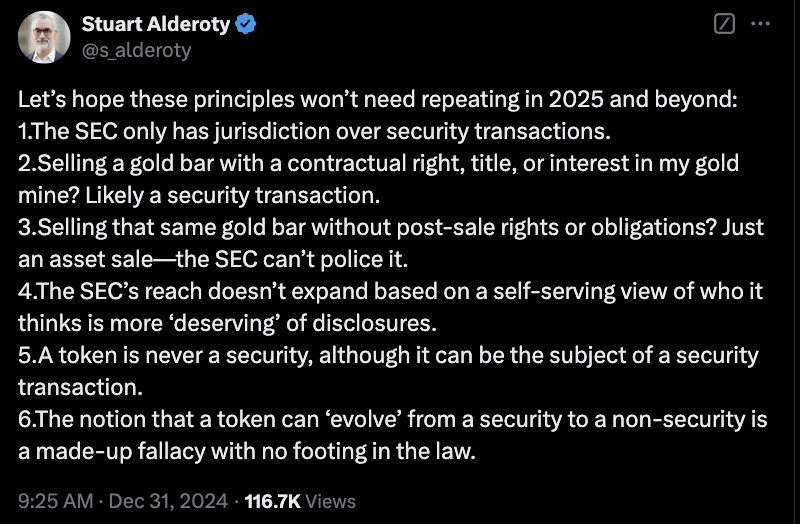The Future of Crypto Regulation in the US: A New Dawn or More of the Same?

As the United States gears up for a new presidential administration and Congress, the digital asset industry is buzzing with speculation. Could this shift in leadership bring more favorable regulations for crypto? Many industry insiders are keeping a close eye on how regulatory bodies like the Securities and Exchange Commission (SEC) might adapt under new leadership.
A Changing Tide in US Crypto Policy?
For years, the SEC has been the regulator most aggressively pursuing enforcement actions against US-based crypto firms. Under both former SEC Chair Jay Clayton and his successor Gary Gensler, the commission has cracked down on major crypto entities like Ripple and Coinbase, arguing that they engaged in unregistered securities offerings.
 Ripple chief legal officer’s regulatory hopes for 2025. Source: Stuart Alderoty
Ripple chief legal officer’s regulatory hopes for 2025. Source: Stuart Alderoty
On December 31, Ripple’s chief legal officer, Stuart Alderoty, took to X (formerly Twitter) to lay out his hopes for 2025. In his post, he urged the SEC to clarify one fundamental principle: “a token is never a security, although it can be the subject of a security transaction.” This statement aligns with Ripple’s ongoing legal battle against the SEC, as the firm continues to appeal a 2024 ruling that found it liable for a $125 million penalty.
But Ripple isn’t the only company eyeing potential regulatory changes. Coinbase’s legal chief, Paul Grewal, also weighed in, highlighting the significance of the US Supreme Court’s decision to overturn the Chevron doctrine in 2024. This ruling limits how much deference courts give to agencies like the SEC in interpreting laws, which could change how digital asset cases are handled in the future.
What Lies Ahead for Crypto Enforcement?
As we step into 2025, several high-profile legal battles involving crypto companies remain unresolved. The SEC and the Commodity Futures Trading Commission (CFTC) are continuing their enforcement efforts, with cases against some of the biggest names in the industry still ongoing.
Meanwhile, the US government has already dealt with major figures in crypto-related criminal cases. Former FTX executives have been sentenced, and Binance’s ex-CEO Changpeng Zhao was sent to prison for four months. But the legal action isn’t over—authorities now turn their sights on former Celsius CEO Alex Mashinsky and Terraform Labs co-founder Do Kwon, who was just extradited from Montenegro.
Given that many of these cases are prosecuted in New York by the US Attorney’s Office, any change in leadership within the Department of Justice or major regulatory bodies like the SEC and CFTC could significantly impact their outcomes.
Will Leadership Shake-Ups Change the Game?
Former President Donald Trump has already made bold statements regarding SEC leadership. He has proposed replacing SEC Chair Gary Gensler with former commissioner Paul Atkins and appointing ex-SEC Chair Jay Clayton as US Attorney for the Southern District of New York. If Trump returns to office and follows through with these plans, we could see a major shift in how crypto regulations are enforced.
The crypto industry remains at a crossroads, with many hoping for regulatory clarity rather than continued ambiguity and enforcement-heavy approaches. With the new administration taking shape and legal battles unfolding, 2025 could be a defining year for the future of digital assets in the United States.
One thing is certain—everyone in the crypto world will be watching closely.
Related: IRS issues temporary relief on crypto cost-basis method changes
Magazine: I became an Ordinals RBF sniper to get rich… but I lost most of my Bitcoin
